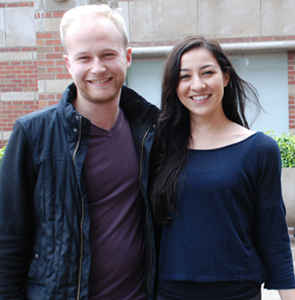
Syuzanna Petrosyan and Greg Irwin
The stories of musicians during the Holocaust guided Syuzanna Petrosyan and Greg Irwin through the Student Voices Short Film Contest, and the result is their winning film Play for Your Life.
Petrosyan, a master’s candidate in public diplomacy, and Irwin, a senior international relations major, are both interns at the USC Shoah Foundation and members of its student organization, SFISA.
Petrosyan said the idea for their Student Voices film was inspired by Alice Herz-Somner, a pianist who up until her death on Feb. 23 at 110 was the oldest living Holocaust survivor. Music factors heavily in Herz-Somner’s testimony in the Visual History Archive, and a short documentary about her, The Lady in Number 6: Music Saved My Life, just won the Oscar for Best Documentary Short Subject.
Petrosyan and Irwin decided to make their film about music performed in concentration camps and the musicians who played while imprisoned. Because such stories are not frequently told, they were eager to bring the musicians in the Visual History Archive some recognition through their film.
Irwin said he and Petrosyan were especially sensitive to how they portrayed the survivors’ experiences in their film. The survivors’ feelings are often complicated – music could bring them moments of happiness, but it also caused pain, such as when they were forced to play for Nazi guards or to cover up screams coming from gas chambers.
Choosing the clips and putting them together proved challenging, they said. Neither had experience with documentary filmmaking before.
“We had to balance both sides so the story came out fully in eight minutes,” Petrosyan said. “We had to be the judge of whether we were being ethical or not.”
Ultimately, the music they found in the testimonies proved to be the most powerful aspect of their film. Petrosyan said that when she showed rough cuts of the film to her classmates, they kept urging her to put in more music.
“Music is more than any words can say,” she said.
Irwin said that after watching hours of testimony, he and Petrosyan felt close to the survivors whose testimonies they watched, and were “heartbroken” when they learned of Herz-Somner’s death. Their attachment to the survivors, and feeling that they knew them personally, is an example of “what the Shoah Foundation is all about,” Irwin said.
“It also shows what you can do with the archive,” Petrosyan added. “I’ve read a lot about genocide, through art, books and lectures, and I never heard stories about this [music in the camps] before.”
Whether or not they win, Petrosyan and Irwin are excited that the Student Voices jury, including Rwandan filmmaker Eric Kabera, will be watching their film and providing feedback. They said the experience of delving into the archive was tremendously meaningful in and of itself.
“It’s such a treasure trove of content,” Irwin said. “When anyone goes into the archive to extract material and is affected by it, it’s a valuable experience.”